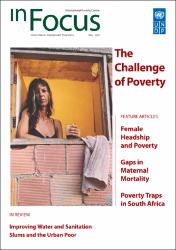Please use this identifier to cite or link to this item:
https://repositorio.ipea.gov.br/handle/11058/15775Full metadata record
| DC Field | Value | Language |
|---|---|---|
| dc.contributor.author | Grinspun, Alejandro | |
| dc.date.accessioned | 2024-10-04T00:07:28Z | - |
| dc.date.available | 2024-10-04T00:07:28Z | - |
| dc.date.issued | 2004 | |
| dc.identifier.uri | https://repositorio.ipea.gov.br/handle/11058/15775 | - |
| dc.description.abstract | "According to an oft-quoted source, 1.2 billion people live in extreme poverty around the globe, surviving on less than US$1 a day. This figure speaks volumes about a world that unabashedly spends trillions of dollars on conspicuous consumption and defense, yet is challenged to spend a fraction of those resources to provide dignified living conditions to so many of its impoverished citizens. Ironically, the ‘1.2 billion’ figure may say a great deal about the state of the world, but it tells very little about poverty itself. Compressed into a single figure, the complex and distinct circumstances experienced by those who find themselves in poverty — their varied trajectories into it, the dimensions in which they are deprived and the reasons for their predicament — essentially become concealed behind a common label. We need to move beyond aggregation, snapshots and easy labels to improve our understanding of poverty. This month, In Focus explores these issues by highlighting some of the shortcomings of conventional analyses of poverty and the complexities involved in conceptualizing it in a more meaningful way. We open with a provocative article that probes into the existence of an alleged close link between household headship and the ‘feminization of poverty’. Female-headed households clearly are disadvantaged in many countries. But the inference that wellbeing is always enhanced in two-parent — that is, male-headed — families is wrong. It is largely informed by the narrow way in which well-being is defined and statistics gathered in conventional poverty research, which also ignores the important dimension of agency that allows women heads to offset gender discrimination as well as the foregone income from a male partner." (...) | en |
| dc.language.iso | en | |
| dc.title | The Challenge of Poverty | en |
| dc.type | Policy In Focus | |
| dc.rights.holder | International Policy Centre for Inclusive Growth | |
| dc.rights.holder | United Nations Development Programme | |
| dc.location.country | Brasil | |
| dc.description.physical | 16 p. : il. | |
| dc.rights.type | Licença total exclusiva | |
| dc.rights.license | O texto e dados desta publicação podem ser reproduzidos desde que as fontes sejam citadas. Reproduções com fins comerciais são proibidas. | |
| dc.subject.keyword | Challenge | |
| dc.subject.keyword | poverty | |
| ipea.access.type | Acesso Aberto | |
| ipea.researchfields | N/A | |
| ipea.classification | Desenvolvimento Social | |
| ipea.classification | Sociedade. Participação Social. Controle Social | |
| ipea.classification | Educação | |
| Appears in Collections: | Publicações do IPC-IG | |
Files in This Item:
| File | Description | Size | Format | |
|---|---|---|---|---|
| en_IPCPovertyInFocus3.pdf | 2.27 MB | Adobe PDF |  View/Open |
Items in DSpace are protected by copyright, with all rights reserved, unless otherwise indicated.

